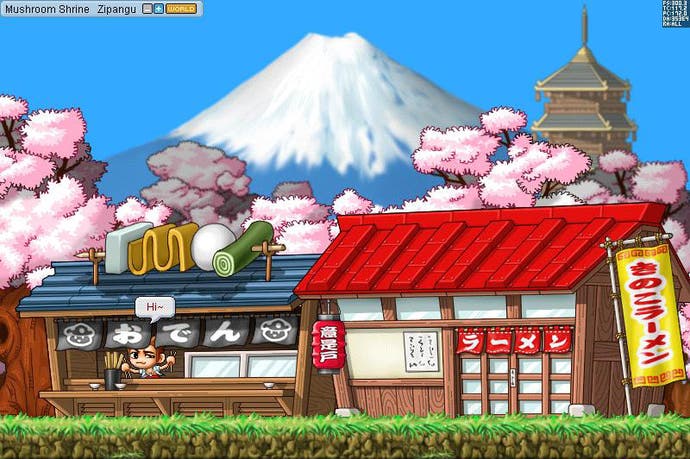MapleStory
25 million Chinese teenage girls can't be wrong. Can they?
And that's not the only thing MMOs can learn from MapleStory. The key to the game's success (and it is undoubtedly successful, even if Nexon's claims of 67 million users are not to be entirely trusted) lies with a careful examination and realignment of the established conventions of online RPGs, in order to make them less threatening to people who couldn't pick a twenty-sided die out of a police line-up. It's this back-to-basics approach - too basic for some - that explains MapleStory's tendency to clean up on the casuals even as it struggles to break into the more hardcore market. And even if veteran MMO fans remain untempted, the average WOW player would find things surprisingly familiar if they ever logged on. From the basic, yet competent, character creation screens (it's always nice to see a haircut option that appears to have been modelled on a young George Orwell alongside the predictable spiky Manga thatches) to the levelling-up process, MapleStory has much of the same clockwork as its more bombastic peers - albeit in simplified, primary-colour form. It has the same loot drops, the same party system, the same grinding, and the same scattering of randoms who would really like you to bring them ten of something.
But there's also a little gentle innovation sprinkled in. Blazing a path other MMOs are starting to consider adopting, MapleStory makes an unlikely alliance with Funcom's Age of Conan by delaying character class selection until around the level 10 mark, when players have had time to work out how they want to proceed. Equally, all new adventurers start out on Maple Island, an area designed to carefully ease players in, and which, once left, more experienced players cannot return to in order to wreck the new kids' fun.

And for those who can get to grips with the sugar-rush presentation, the all-important game world, though no Azeroth, still has charm to spare - a nostalgic playground of rope bridges and ladders, from the craggy, Aztec-inspired Perion, to the eighties B-Boy urban decay of Kerning City and the snowy wastes of El Nath. Even that childish, e-card art style proves surprisingly flexible, capable of accommodating all the giant tomatoes, Lear jets, gothic cathedrals, and slack-jawed wolves the designers can throw at it without ever seeming internally inconsistent - a real achievement over the more limited palettes of some MMOs.
But that doesn't mean everything's perfect in Maple World. Without the distracting grandeur and drip-feed of genuinely breath-taking new vistas that more expansive games can offer, MapleStory's grind can set in early, and causes a lot of premature departures. Equally, despite a largely pleasant community, MapleStory has suffered more than other games due to the ease with which players can apply hacks, ranging from in-game bots through to instant drops and unlimited attacks. After a long period in the wilderness - during which some players felt the small numbers of GMs were in danger of losing control of entire continents - Nexon has retaliated, Guantanamo Bay-style, with heavy banning and draconian security software which can make logging in only slightly less complicated than applying for a top post with the NSA. It's lead to an improvement in service, but can never hope to eradicate the problem entirely.

Yet even though many players find it limited, some leave in frustration at the constant grind, and the visuals stop yet more from logging on in the first place, MapleStory may turn out to have been surprisingly influential years from now. The style and interface might pitch the game as My First MMO - and to many players, it is - but the sheer amount of FAQs and YouTube clips hint at a deeper complexity for those with the inclination to look for it. By aiming MapleStory at as wide a demographic as possible, the developers have slowly evolved the game into an experience that often manages to get that elusive balance between ease of use and depth of play just right. If you're looking for a primer in MMO basics, you could look to Wizet as well as Blizzard.
And even as Nexon starts its quiet advance into other media (an anime series and iTrading card game were released in 2007, and an - initially - Korean-only, non-MMO DS version, co-developed by Nintendo, is slated for 2008), the original game show no signs of losing its appeal with those near-invisible masses. MapleStory may be trivial, but it's often refreshingly so. It may be calculated, but it's frequently also charming. It may be an embarrassment amongst the elite, but its low-key brand of success suggests this modest super-hit is playing a vital role as an entire genre continues to conquer a mainstream audience.








